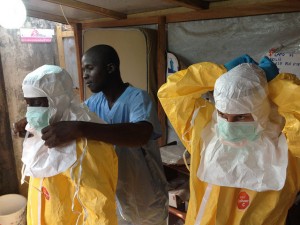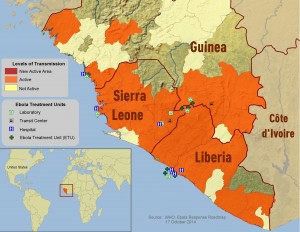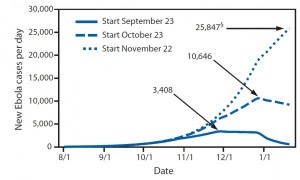By Anna Alvarado | SQ Staff Writer | SQ Online (2014-15)

This past summer, the World Health Organization (WHO) announced a widespread outbreak of the Ebola virus across West African countries, declaring it a worldwide emergency that needed immediate global response. The disease quickly spread through multiple African countries within just a few short months, affecting thousands of African people, which made it the largest Ebola outbreak in history. So far, it has spread throughout Liberia, Guinea and Sierra Leone, infecting over 6,000 people and claiming nearly over 3,000 lives, and shows no signs of stopping any time soon, with predictions of over 1.4 million people being infected by this January. There is currently no direct cure for this deadly virus with only treatment options available for symptom relief, and it continues to spread across the African continent, alarming many world leaders and health organizations.

The Ebola Virus Disease (EVD) was first identified in 1976, and since then, 20 outbreaks have occurred, killing roughly 1,600 people over the span of nearly 40 years. The current outbreak far surpasses previous figures, impacting thousands of people within months of its emergence. One reason for this extreme epidemiologic result is the nature of the virus. The disease contains a whole range of fairly nonspecific symptoms including fever, diarrhea, abdominal pain and vomiting. There are currently no vaccines or cures for this disease, and it is transmitted via contact with infected fluids including blood. Various treatment options are available to alleviate symptoms and increase the chance of patient survival, but this requires both immediate clinical intervention and intensive patient care. In addition, those infected with the disease must be quarantined properly to contain the virus and must be tracked constantly to prevent its spread. However, containment is difficult due to large populations and the constant exchange and movement between countries.

Furthermore, West African countries lack adequate supplies and proper protocols for disease control, which could explain why it has spread so rapidly and why they were impacted so heavily in comparison to the rest of the world. This sudden outbreak is underscored by issues in global health response and a stark disparity in the quality of healthcare. The disease easily proliferated due to the lack of proper health care infrastructure, which usually contained limited amounts of staff and supplies, like protective gear and medicine for supportive care. The high transmissibility of the disease and the lack of proper care and containment contributed significantly to the rising death toll and the magnitude of this outbreak. According to a study from the New England Journal of Medicine, despite the increasingly high risk of contracting Ebola in West Africa, it is highly unlikely that the disease will spread in the same manner in many western countries, like the United States, because of the differences in the quality of healthcare.
The severity of the outbreak called for action from the United Nations, the WHO and other health organizations for global assistance during this time of crisis. Recently, President Barack Obama addressed world leaders and health organizations, pleading for a faster response to the outbreak and urging other countries to increase aid and support to the still-suffering West African countries. There is an increasing need for more qualified healthcare personnels, treatment facilities and proper containment techniques and protocols. Many organizations, such as Doctors Without Borders and the WHO, have made efforts to send volunteers and aid to the impacted countries, but the demand for these things far outweighs the amount supplied. Many hospitals are over capacity, with only few, overworked staff to care for hundreds of patients. Therefore, current efforts have been too slow to curb the outbreak, leading to continued spread of panic and growing disillusionment with and distrust of physicians and other healthcare professionals.
Many Africans fear physicians and often turn to alternative treatments instead of approaching specialized facilities for containment of the disease. External aid coming from Doctors Without Borders and the Red Cross are often barred from villages due to increased fear of the disease and the belief that these volunteers are the reason for the spread of Ebola, further delaying treatment and containment. Some victims are seeking alternative treatments and traditional healers, often contributing to further transmission of the disease and making strategies for treatment and containment more difficult to enact. At the same time, premature treatments are being introduced as an attempt to cure symptoms of Ebola. The most prominent treatment is the administration of ZMapp, a therapeutic drug that was administered to two U.S. citizens who contracted the virus in Africa. The two patients showed clinical improvement, but it remains unclear whether the drug is responsible for the improvement because there are only two known cases of its efficacy in humans. The use of these incomplete treatments could do more harm than good and could further foster the distrust between patients and physicians if it proves ineffective.
West Africa continues to suffer from this terrible epidemic and requires immediate response before the disease spreads to an even larger extent. The calls for more medical aid, facilities and volunteers must be answered, and engagement and cooperation with local communities must be made to fight this outbreak. So far, hundreds of volunteers and supporters have emerged to aid Africa during this epidemic. Hopefully, their increased efforts, along with further scientific research on proper cures, will help fight the disease and end Ebola once and for all.
[hr gap=”0″]
Related Links
- http://america.aljazeera.com/articles/2014/8/12/ebola-zmapp-ethics.html
- http://www.pbs.org/newshour/rundown/mistrust-doctors-west-africa-makes-harder-fight-ebola/
- http://www.cdc.gov/vhf/ebola/outbreaks/2014-west-africa/index.html
- http://www.who.int/csr/disease/ebola/en/
- http://news.sciencemag.org/africa/2014/09/who-cdc-publish-grim-new-ebola-projections
- http://online.wsj.com/articles/ebola-death-toll-nears-3-000-in-west-africa-says-who-1411639068
Click here to read the featured piece on the Fall 2014 Volume 2 of the SQ Insider.